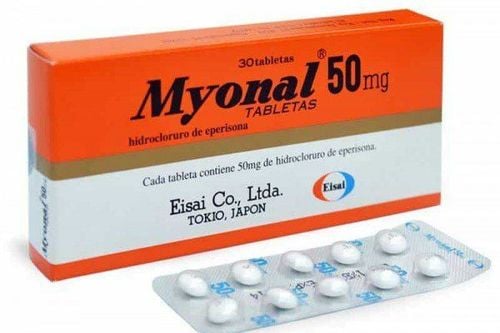This is an automatically translated article.
Imidapril is an ACE inhibitor antihypertensive drug. The drug lowers blood pressure by reducing vascular resistance but does not increase heart rate due to compensatory reflexes. The article will provide some information on dosage, side effects and some notes when using Imidapril.1. What is Imidapril?
Imidapril is an ACE inhibitor antihypertensive drug. Imidapril is a prodrug which, after oral administration, is converted to active imidaprilat. Normally, angiotensin converting enzyme (ACE) converts Angiotensin I into Angiotensin II, which has strong vasoconstrictor activity, increases blood pressure and stimulates the adrenal gland to secrete aldosterone. The mechanism of action of Imidaprilat is to inhibit the Angiotensin-converting enzyme, thus, preventing the conversion of Angiotensin I to Angiotensin II leading to a decrease in vasoconstrictor effects and a decrease in Aldosterone secretion. In addition, ACE also plays a role in breaking down bradykinin into inactive substances, thereby inhibiting ACE leads to increased activity of the kallikrein - kinin system in the circulation and locally causing peripheral vasodilation through its activity. prostaglandin system. Imidapril also indirectly increases the production of vasodilator factors such as nitric oxide. Overall, Imidapril lowers blood pressure by reducing vascular resistance but does not increase heart rate by compensating reflexes.Imidapril reduces the production of Aldosterone and antidiuretic hormone, thereby causing increased potassium concentration, increased sodium and water excretion. Following oral administration, Imidapril is rapidly but incompletely absorbed with an oral bioavailability of approximately 70%. Peak plasma concentrations of Imidapril are reached approximately 2 hours after dosing. Approximately 40% of the dose is excreted by the kidneys, the remainder in the feces.
2. What are the indications for Imidapril?
Imidapril is indicated for the treatment of essential hypertension in adults3. What are the contraindications of Imidapril?
Imidapril is contraindicated in the following cases:There is a history of severe hypersensitivity to Imidapril or other ACE inhibitors. History of angioedema associated with ACE inhibitors. Hereditary or idiopathic angioedema. Pregnant women in the second and third trimesters of pregnancy. Severe renal failure (ClCr < 10ml/min). Concomitant use of Imidapril with aliskiren in patients with renal impairment (GFR < 60 ml/min/1.73 m2) or diabetes mellitus.
4. Dosage and Administration of Imidapril
4.1 Dosage
AdultsThe recommended dose is 5-10mg/time/day. The dose may be adjusted depending on the age and symptoms of the patient.
For patients prone to hypotension after taking the first dose:
Water and electrolyte deficiencies should be treated and all diuretics being discontinued for 2 - 3 days before taking Imidapril. If not, reduce the first dose to 2.5 mg/day.
Hypertension with heart failure:
The starting dose is usually 2.5 mg/day, then gradually increase to the target dose according to the patient's tolerability.
Children
There are no safety studies on the effectiveness of Imidapril in children. Therefore, Imidapril should not be used in children.
Patients with renal impairment:
CrCl: 30 - 80ml/min: the starting dose of Imidapril should be reduced to 2.5 mg/day. CrCl: 10 - 29ml/min: Due to limited experience, Imidapril should not be used in these patients. CrCl: < 10 ml/min: Imidapril is contraindicated. Patients with hepatic impairment:
The starting dose is usually 2.5mg x 1 time/day.
Elderly patients:
Initial dose is 2.5 mg x 1 time / day, then need to adjust the dose according to the patient's response. The maximum recommended dose is 10mg once daily.
4.2 Usage
Imidapril is administered orally. Drink 1 time a day, 15 minutes before meals and should be taken at a fixed time of day. Because patients may experience hypotension with the first dose after using Imidapril, the first dose should be taken at bedtime.5. How to deal with Imidapril overdose
OverdoseOverdosage of Imidapril can lead to symptoms including: Excessive hypotension, bradycardia, electrolyte disturbances, shock, unconsciousness and impaired renal function.
Treatment in case of overdose
When overdosing on Imidapril, the patient should be closely monitored, regularly checked for electrolytes and serum creatinine levels. Treatment measures include symptomatic and supportive treatment, including gastric lavage, use of adsorbents and sodium sulfate within 30 minutes of overdose.
If excessive hypotension occurs, place the patient in a shock position and administer 0.9% sodium chloride infusion. Atropine can be injected to treat bradycardia and vagus nerve overstimulation. Use of a pacemaker may be considered in some cases. Hemodialysis can remove imidapril and imidaprilat from the circulation, however, the use of membranes with a high filtration rate should be avoided.
6. Undesirable effects of Imidapril
When using Imidapril, patients may experience the following side effects:Common:
Headache, dizziness, nausea, dry cough, fatigue, somnolence. Uncommon:
Rhinitis. Epigastric pain, digestive disorders. Palpitations, paresthesia, syncope. Itching, skin rash. Bronchitis, upper respiratory infection. Chest pain, limb pain, edema. Increase in serum potassium, increase in serum creatinine, increase in serum urea, increase in liver enzymes. Rare
Anemia, leukopenia. Increased amylase, increased AST, increased alkaline phosphatase, decreased serum albumin, decreased serum protein, decreased renal function.
7. What are the precautions when using Imidapril?
Imidapril should be used with caution in patients with severe renal disease and in patients with bilateral renal artery stenosis. Particular care should be taken in the following subjects when using Imidapril because of the potential for temporary but severe hypotension after initiation of treatment. A lower dose should be started, then increased slowly, while closely monitoring blood pressure and side effects. Patients with severe hypertension. The patient is on dialysis. Patient is taking diuretics Patient is on a strict salt diet. Imidapril should be used with caution in patients with cerebrovascular disorders because a sharp decrease in blood pressure can cause a lack of blood supply to the brain, which may worsen the patient's condition. Risk of hyperkalemia, particularly in patients with renal impairment, in patients with diabetes mellitus, or in concurrent use with potassium-sparing diuretics or other drugs that may increase potassium levels (eg, heparin). When using Imidapril with the above drugs, it is necessary to closely monitor the patient's blood potassium levels. During treatment with Imidapril, a dry cough may occur. When the dry cough becomes severe and affects the patient's life, the patient should contact the doctor or pharmacist for advice and change medicine if necessary. Surgery: Imidapril, like other ACE inhibitors, can cause severe hypotension or even shock in patients undergoing major surgery. If the patient's Imidapril and blood pressure cannot be well controlled, it should be discontinued before and during surgery. There is a risk of angioedema of the face, lips, tongue, larynx, glottis may occur when taking the drug. When having the above signs, the patient should stop taking the drug immediately and immediately go to the nearest medical facility for treatment. Pregnancy: Imidapril and other ACE inhibitors are not recommended during the first trimester of pregnancy because of the increased risk of teratogenicity. When pregnant, the patient should stop taking the ACE inhibitor immediately and contact the doctor to change to another alternative. For pregnant women in the second and third trimesters of pregnancy, using ACE inhibitors can cause fetal toxicity such as decreased amniotic fluid, impaired kidney function, delayed ossification of the skull, .. Therefore, do not use ACE inhibitors for pregnant women, especially in the second and third trimesters of pregnancy. Lactation: Imidapril should not be used by women who are breast-feeding. If the use of Imidapril is essential for the mother, breast-feeding should be discontinued for the duration of the dosing period. Ability to drive and use machines: The drug may cause dizziness and lightheadedness due to its hypotensive effect. Therefore, patients need to be careful when driving and operating machinery while taking the drug. Interaction with other drugs: Concomitant use of Imidapril with some drugs and supplements may increase side effects or reduce the effectiveness of the drug. Therefore, patients need to inform their doctor or pharmacist about all medicines and dietary supplements they are taking for advice. In summary, Imidapril is used in the treatment of hypertension. Patients need to adhere to the prescribed dose to ensure safety and effectiveness when taking the drug.Please dial HOTLINE for more information or register for an appointment HERE. Download MyVinmec app to make appointments faster and to manage your bookings easily.













